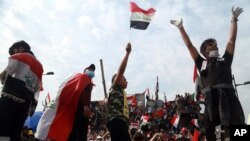Anti-government protesters in Baghdad shut down roads and government offices in the Iraqi capital on Sunday, escalating a month-long string of rallies demanding political change.
Tens of thousands of demonstrators have gathered in recent days in Baghdad's Tahrir Square and across southern Iraq, shutting down markets, factories, schools and universities in protest of the political system in place since the 2003 U.S.-led invasion that toppled dictator Saddam Hussein.
Prime Minister Adel Abdul-Mahdi called for the shuttered places to be reopened, contending that the threat to oil facilities and closure of roads had cost Iraq "millions" of dollars and contributed to consumer price increases in the country.
"It's time for life to return to normal," the Iraqi leader said.
Thousands of students have skipped classes to join the protests, blaming the country's leaders for rampant corruption, high unemployment and poor public services. Syndicates of engineers, doctors and lawyers have all backed the protests.
The protesters on Sunday blocked roads around the main protest site with burning tires and barbed wire. At one roadblock, the demonstrators unfurled a banner saying, "Roads closed by order of the people."
Since early October, security forces have fired military-grade tear gas, rubber bullets and live ammunition at the protesters, killing at least 256 people. After a brief hiatus, the protests restarted again Oct. 25, with frequent clashes on two bridges leading to the heavily-fortified Green Zone, the headquarters of the government and home to several foreign embassies.
The government has proposed a string of reforms, including more jobs and social welfare plans, along with early elections once a new voting law is adopted.
But the protesters have continued to challenge the government.
"We decided on this campaign of civil disobedience because we have had it up to here with the government's lies and promises of so-called reform," Mohammad al-Assadi, a government employee on strike in the southern city of Nasiriyah, told Agence France Presse.
The protests are leaderless, without an organizational structure, and they are not unified.
However, they have drawn a wide swath of the population from across the country’s sectarian and ethnic divides.
A move in Iraq’s parliament to approve a bill to cancel privileges and bonuses for senior politicians, including the president, prime minister and Cabinet ministers, has done little to calm the marchers.





